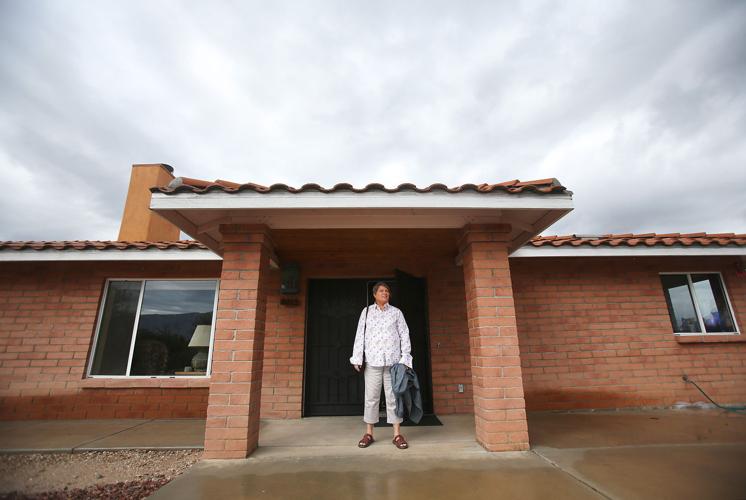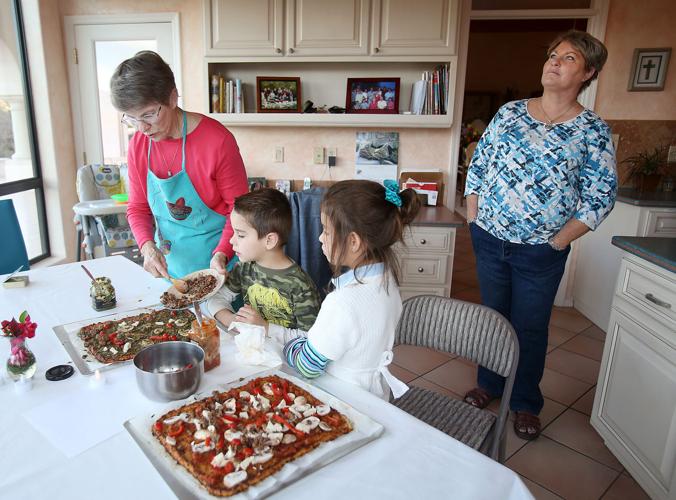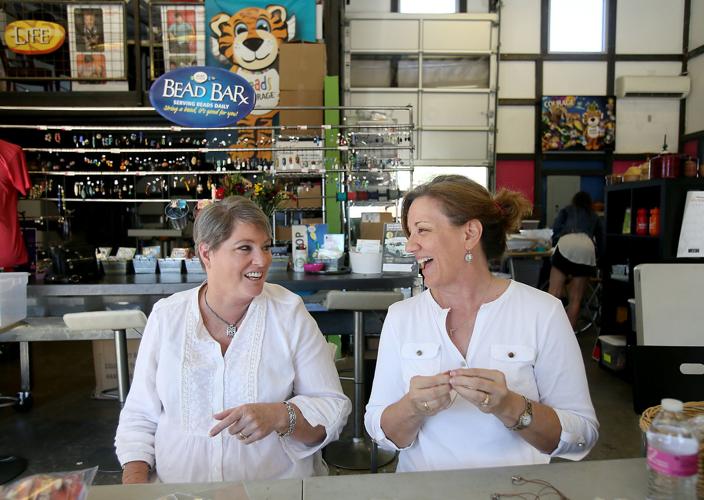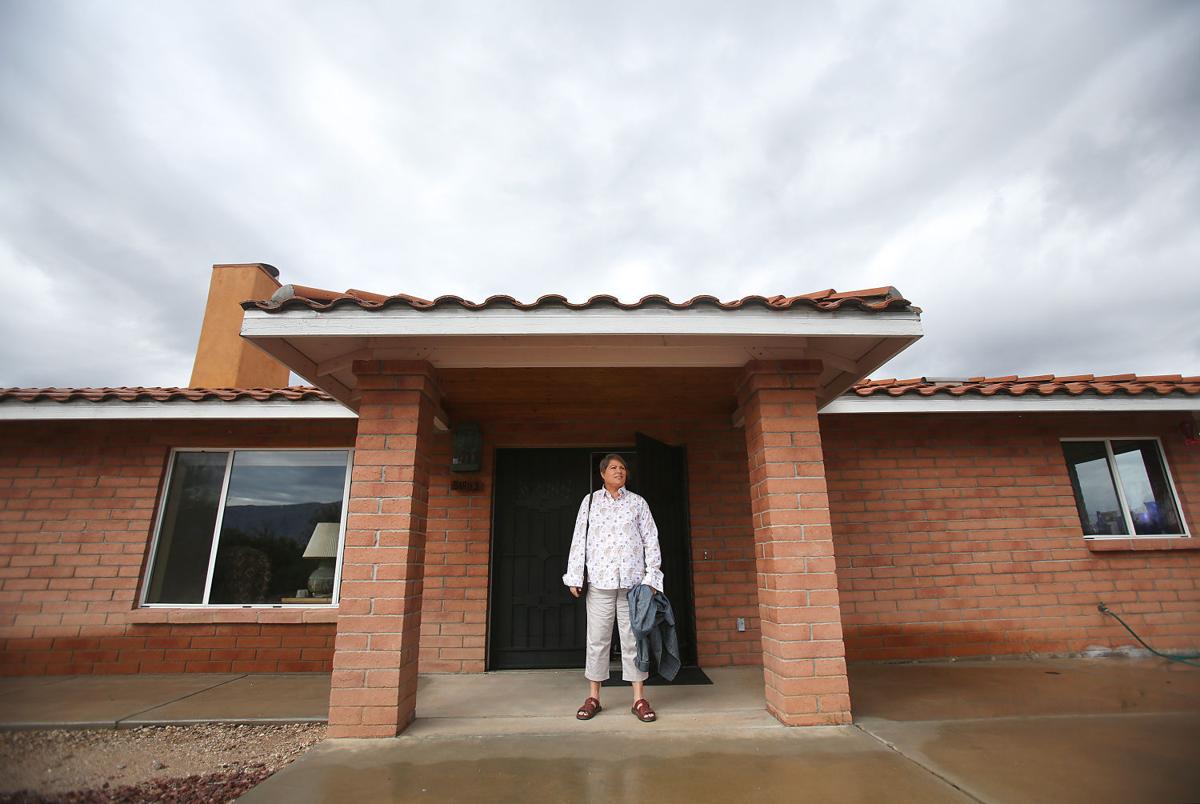Cheryl Minarik Baril would have made a great politician. She is an extrovert and a hugger. She adores children.
By the time she was 6, Cheryl would greet strangers with a smile, say hello and stick out her hand for a handshake, just like her politically savvy grandfather, Frank Minarik. Now, her four adult kids use words like “vivacious” and “charismatic” to describe her.
Cheryl, born in 1960, is the eldest of three siblings. She is the only one still alive.
Her brother and sister — like their father, their grandmother and their great-grandmother — died of early-onset familial Alzheimer’s disease. Everyone in their gene pool has a 50-50 chance of inheriting the mutation that causes it, and and those with the mutation are virtually guaranteed to get the disease, probably in their 40s.
“I am lucky. I have lived a long time, longer than the others,” she said recently. “It is kind of scary.”
At 55, Cheryl has been living with Alzheimer’s for nearly eight years officially. Her family suspects the drugs she takes for rheumatoid arthritis may have a suppressive effect on her Alzheimer’s, although no scientific evidence backs that up.
Rheumatoid arthritis is an inflammatory disease., and one theory is that Alzheimer’s has an inflammatory component as well. It’s possible that powerful agents like methotrexate or Enbrel may have held back Cheryl’s Alzheimer’s, said Dr. Geoffrey L. Ahern, her neurologist at Banner-University Medical Center Tucson.
But it could be the other way around — Ahern said people with rheumatoid arthritis seem to have a lower incidence of Alzheimer’s. There may be something about rheumatoid arthritis that is inimical to Alzheimer’s, he said.

Mark Baril helps his wife, Cheryl, get her Thanksgiving plate of food together at Mary Kay Bush’s home. When they started dating in college, Mark knew Cheryl’s father was sick, but no one had yet recognized the disease that was gripping the Minarik family.
Wink and a marriage
It is not apparent at first that Cheryl has Alzheimer’s disease. Only after she repeats things and asks the same questions, sometimes three or four times, does it become obvious that her short-term memory is severely impaired.
It’s common for people with Alzheimer’s to believe they are living in their long-term memories. They’ll think people who are long dead are still alive. That’s not Cheryl. Her long-term memories are intact, and so is her sense that they are memories and not her current life. She knows that both her siblings, Beth and Steve, have died from Alzheimer’s disease.
She remembers precise details from her youth, including the moment when she met her husband, Mark Baril. They were both students at Northern Arizona University. Mark was studying engineering and Cheryl, who had recently broken off an engagement, was studying sociology. They were at a Campus Crusade for Christ retreat. Mark, who is 6-foot-4, was playing guitar and Cheryl winked at him. More than once.
“I’d never had a girl do that before,” Mark said. “She decided she’d found the boy she was going to marry, unbeknownst to me.”
They were opposites. Mark is an introvert, logical and good with details.
Cheryl loves being around people, being on the move. Those differences took some getting used to for both of them.
Four children
When they began dating, Mark was aware that Cheryl’s dad, Smitty, was sick, but no one understood yet the magnitude of disease that had gripped the Minarik family. Cheryl wanted children and Mark, who is one of 10 kids, wanted the same.
Krista was born in 1983, Kyle in 1986, Derek in 1989 and Kaila in 1992. Cheryl home-schooled them for nine years, helped lead a local association of homeschooling parents, and was later president of the Parent Association Committee at Desert Christian High School, which her kids attended.
Full of energy, she loved to clean and organize. In her spare time she cleaned houses to earn extra money.
When her oldest son, Kyle, was a high school freshman, Cheryl did a few things that, in retrospect, might have been early signs of Alzheimer’s. She sometimes forgot to pick up Kyle from school, and when the family would give her a list of what to buy at the grocery store, she’d come back without the groceries they’d requested — but with many items they didn’t need.
Concerned about her forgetfulness, Cheryl began taking vitamin B12 and started writing everything she needed to do in a daily planner. But the memory lapses persisted.
In 2007, a little more than a year after her younger sister Beth was diagnosed with Alzheimer’s, Cheryl and Mark visited Dr. Ahern, the neurologist who had treated Beth. She was 46 years old.
Not the mom they knew
Though Cheryl was not officially diagnosed through a blood test for another year, after that first visit with Ahern they knew it was Alzheimer’s.
“We had a family meeting and it was traumatic,” Mark said.
The whole family went on a trip to Mission Bay in San Diego. They decided the best way to handle the diagnosis was to come together, and that’s what they’ve tried to do ever since. But there have been struggles.
“I took on a lot of responsibility in high school,” said Kaila, the youngest.
Watching Beth and Cheryl’s brother Steve decline, the Barils expected Cheryl to follow the same course. Steve was diagnosed two years after Cheryl, but his symptoms progressed quickly by comparison. He died six years after his diagnosis.
Cheryl’s illness stayed at bay for a long time. When her grandmother died in 2012, Cheryl’s mother Mary Kay wrote a eulogy and asked the minister to read it. Cheryl insisted that she would read it — and she did. Mark stood behind her but she didn’t need his help.
“She was completely articulate,” Kyle said. “It was flawless.”
But she is not the same mother her children grew up with.
“The chatty, bright person that was once my mother; the woman who could make a grouch smile with ease, has begun to fade,” Derek Baril, 26, wrote a few years ago in an essay about his mother, “My Inheritance.” It is written from Kaila’s point of view but speaks to what he’s experienced, too.
“It is as if her sharp tasting personality has been heavily watered down, and the process has taken a toll on her spirits as well as ours,” he wrote of Cheryl.
“Sometimes it is difficult to recall who she was before the disease, and indeed, the battle of loving her and hating the disease is constant. During those moments when my patience does wear thin, it is easy to be tricked into channeling my frustration at my mother.”

Though her long-term memory is intact, Cheryl can no longer be at home by herself and spends most days of the week at the house of her mother, Mary Kay, shown helping her great-grandchildren Ava Buelna, 5, and Ben, 4, make pizza.
“I am going to die”
The changes in Cheryl are accelerating. Mark, who works from home, no longer leaves his wife alone. Her balance is off, as is her hand control. She makes jerking motions, caused by multiple neurons firing at once. Eating on her own is getting difficult.
Cheryl spends a lot of time with Mary Kay, with Mary Kay’s friends, and also with her own close friends — a group of women she’s known since the 1980s.
At her last appointment with neurologist Ahern, her performance on her annual Mini Mental State Exam dropped significantly for the first time. The test, among other things, asks the patient to count backwards, spell backwards, recall words, read, write and copy a drawing of intersecting pentagons.
Mary Kay brings Cheryl to her weekly game mornings at Immanuel Presbyterian Church. Cheryl doesn’t play, but goes from table to table socializing. She walks a lot and doesn’t like sitting for long. Her attention span for movies and television shows has waned.
She is an open book, always interested in talking about hope for treatments and cures for Alzheimer’s. She’ll ask Mark about her condition, whether it’s worse than before, and she accepts whatever he says. They still look at one another with the knowing recognition of romantic love.
“I have accepted that I am going to die,” she said. “But I want something in place for my kids and my grandbabies, my beautiful grandbabies.”
Mark recently told her that people with Alzheimer’s can get suspicious and hoard things they like.
“Sometimes you do that, like with candy, because you like candy,” he said.
Cheryl looked at him, nodded, and smiled. Then she laughed.
“I guess I would do that with candy,” she said.
Like her father, Cheryl doesn’t complain about being sick, has complete trust in her spouse, and is almost always smiling. She used to love to drive up Mount Lemmon when her kids were younger. One of the last times she drove, a policeman pulled her over. She told him she had Alzheimer’s and asked him to call her mother.
She doesn’t drive anymore.

Cheryl Baril has weekly dates with friends she met years ago at church. On this outing, she volunteers with Tina Clay at Beads of Courage. The weekly activity serves to assure Cheryl she won’t be sitting at home all day. She’s been living nearly nine years with her diagnosis.
Laughter rings
Mark has a favorite line from the film “The Shawshank Redemption:” “Get busy living or get busy dying.”
He says the family gets strength from their belief in God. They also rely on one another and on the support they receive from Calvary Chapel, which Mark and Cheryl attend, and from Mary Kay’s church.
“It’s really important we’re not going through this alone,” he said. “That’s what true love for one another is. It is a huge blessing to have a support system.”
It would be easy to get lost in the pain, to be consumed by anger. They choose not to. Go to any of their family gatherings and it’s nearly impossible not to hear laughter.
“You can feel sorry for yourself, but everyone has something. Our kids have friends who have already lost a mom or dad,” Mark said.
“We feel fortunate. We are not a sad family.”






